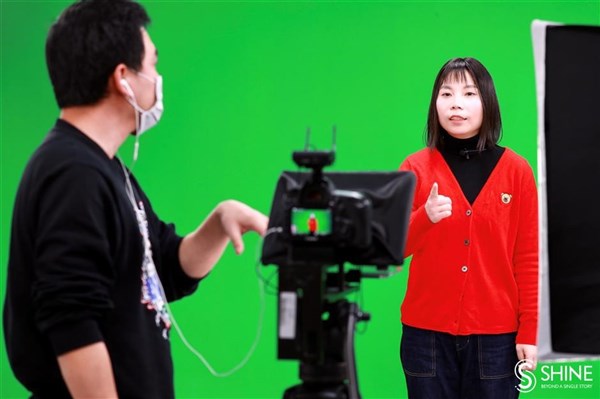Shanghai Today
Cameras roll as teachers present classes - February 28, 2020
上海优秀中小学教师录制在线课程

“Ready? Go!”
“Hello, everyone. Long time no see. Do you miss the school as I do?
“May I do it again? I didn’t pronounce two words correctly.”
“I think you can speak more slowly and louder with more gestures.”
“OK. Let’s do it again.”
Not a scene from the making of a movie, but teachers at Minhang Experimental Primary School making a 15-minute online lesson for students stuck at home during the novel coronavirus epidemic.
Kang Min, Party secretary of the school, said it is producing seven lessons for students to properly arrange their studies and adjust to life at home.
“We believe such lessons are urgently needed as students are spending an especially long and confined holiday,” she said. “They need some psychological guidance. We are not going to provide professional psychological counseling directly, but lessons to help them keep in a good mood. We also hope to guide students to develop good study habits via these lessons.”
The lessons include instructions on reading, sports, music, art, science, and even housework.
Kang said that although only several teachers were presenting the classes, there was a team making preparations in advance for each class, from choosing topics to designing lessons.
“The scripts alone have to be revised several times before shooting begins,” said Kang.
Wang Xiaofeng, an art teacher at the school, was a member of the team creating a lesson to teach students art work at home, including making bunny dolls with tissue paper, making windbells with colorful paper and dough modelling.
“We had a brainstorming last week to decide what we will teach in the lesson and worked together to prepare all the materials needed,” said Wang. “We’ve chosen those that can be done with materials easily found at home, such as tissue paper. Every family has tissue paper. And for the modelling part, we had planned to use clay. But not every family has clay at home, so we decided to use dough.”
Yao Liping, another art teacher, presents the class.
“It is the first time I’ve appeared on screen for a class, so I was a little bit nervous at the beginning,” she said.
Yao said she tried out the lesson at home first to make sure everything went smoothly.
“I prepared the dough at home because it takes a long time,” she said. “I colored the dough in green and orange with spinach and carrot juice. I had planned to make some brown dough, but I don’t have chocolate powder and coffee didn’t work well.”
Chen Tao, who teaches Chinese, produced a lesson on reading, instructing students to find a comfortable space to read and recommending some books.
“As a teacher, I am used to teaching in front of students, with their feedback inspiring me in return,” she said. “To lecture in front of the camera without students, I have to imagine the questions they might raise and answer them by myself. It’s a new challenge for me.”
Kang said the lessons will be posted on the school’s WeChat and broadcast on Minhang District TV.
She said the school will not record regular classes as the Shanghai Education Commission had organized teachers from around the city to produce online classes for broadcast on TV and Internet from March 2. Seven teachers from the school have been helping the commission produce 59 lessons in six disciplines.
“We are not going to increase the burden on parents and students,” Kang said.
She said teachers had watched the lessons in advance and had talks on designing online discussions for students afterward.
Kang said the school had learned that some parents were worried as they had gone back to work and their children may have difficulty in attending the online classes by themselves. Some parents also worried about the effects of online schooling.
She said parents could relax as the school would not require students to clock in and they could help their children with watching replays when they were back home. The school will also assess the results of the online schooling when students return to school to teach the lessons again if necessary.
“So parents need not to be anxious. We will make sure no students are left behind,” she said.
Some teachers are also parents, who need to organize their students and after-class discussions while helping their own children.
“In the test lesson on Tuesday, I used a computer and mobile phone to check attendance and organize discussions, while my third-grade daughter used a tablet to do her part,” said Chen. “It’s not a big problem for children to use devices because they have experience in online classes in other ways, such as in cramming schools. The problem is we should improve the way we organize discussions.”
She said that after the first trial lesson, teachers had quickly adjusted the original plan to make communication more efficient, such as only allowing students to see their own words and those of their teachers, rather than those of their classmates, and setting time limits for answering each question.
“It’s a new way of schooling for all of us, teachers, parents and students,” said Kang. “We all need time to adapt to it and work together.”

